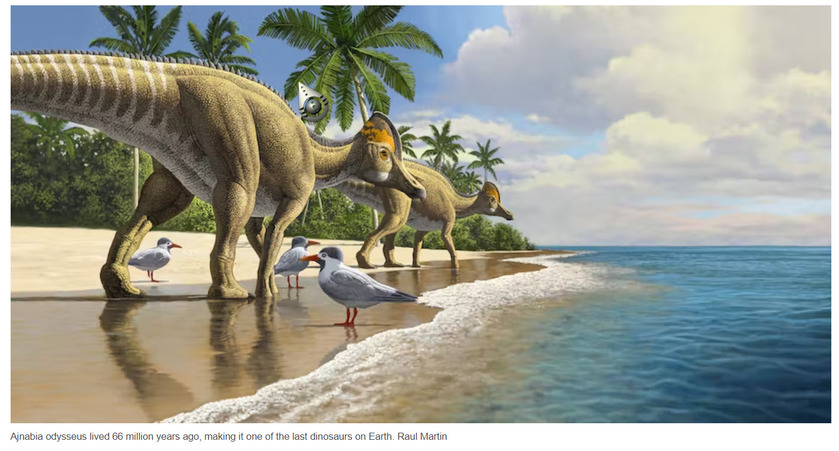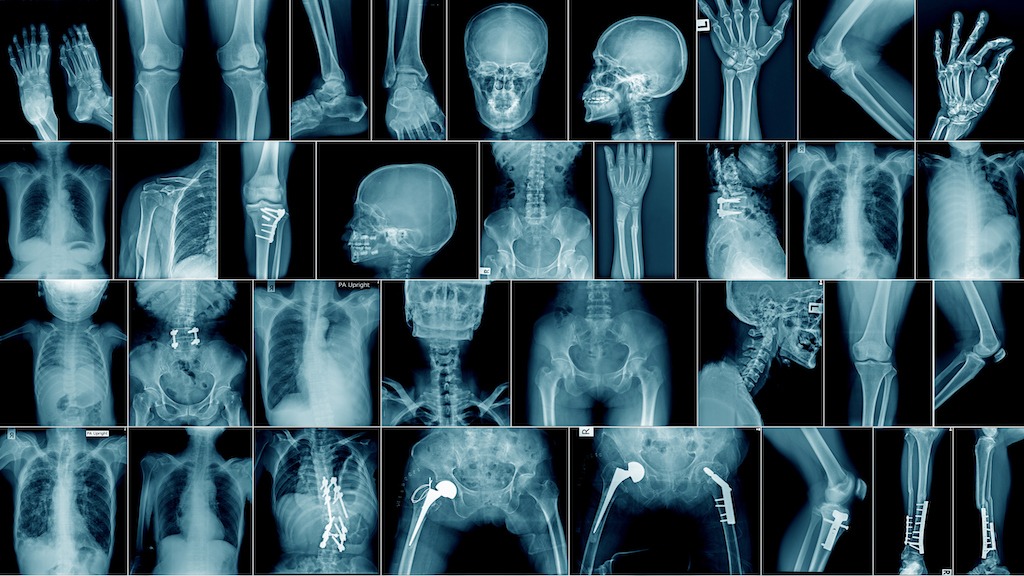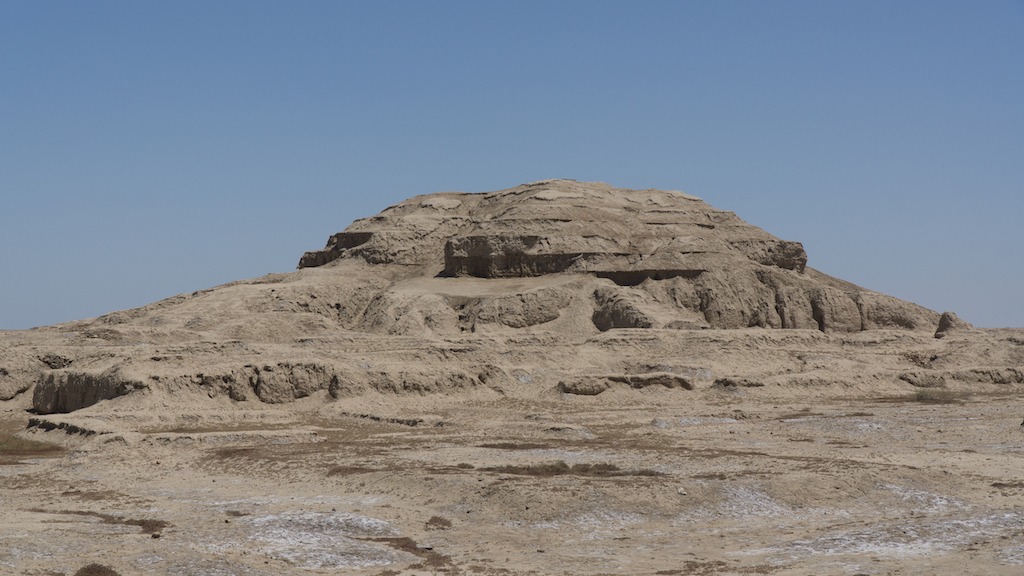Today for fun we are going to look at a what if. What if the Dinosaurs continued to evolve. Would the Dinosaur become the most intelligent on Earth? The following article from interestingengineering.com written by Nicholas R. Longrich explores this what if:
"Sixty-six million years ago, an asteroid hit the Earth with the force of 10 billion atomic bombs and changed the course of evolution. The skies darkened and plants stopped photosynthesising. The plants died, then the animals that fed on them. The food chain collapsed. Over 90 percent of all species vanished. When the dust settled, all dinosaurs except a handful of birds had gone extinct.
But this catastrophic event made human evolution possible. The surviving mammals flourished, including little proto-primates that would evolve into us.
Intelligent dinosaurs
Imagine the asteroid had missed, and dinosaurs survived. Picture highly evolved raptors planting their flag on the moon. Dinosaur scientists, discovering relativity, or discussing a hypothetical world in which, incredibly, mammals took over the Earth.
This might sound like bad science fiction, but it gets at some deep, philosophical questions about evolution. Is humanity just here by chance, or is the evolution of intelligent tool-users inevitable?
Humans as Earth's dominant species
Brains, tools, language and big social groups make us the planet’s dominant species. Currently, there are 8 billion Homo sapiens across seven continents. By weight, there are more humans than all wild animals.
We’ve modified half of Earth’s land to feed ourselves. You could argue creatures like humans were bound to evolve.
In the 1980s, palaeontologist Dale Russell proposed a thought experiment in which a carnivorous dinosaur evolved into an intelligent tool user. This “dinosauroid” was big-brained with opposable thumbs and walked upright.
It’s not impossible but it’s unlikely. The biology of an animal constrains the direction of its evolution. Your starting point limits your endpoints.
If you drop out of college, you probably won’t be a brain surgeon, lawyer or NASA rocket scientist. But you might be an artist, actor or entrepreneur. The paths we take in life open some doors and close others. That’s also true in evolution.
There was something about Sauropods
Consider the size of dinosaurs. Beginning in the Jurassic, sauropod dinosaurs, Brontosaurus and kin evolved into 30-50 tonne giants up to 30 meters long – ten times the weight of an elephant and as long as a blue whale. This happened in multiple groups, including Diplodocidae, Brachiosauridae, Turiasauridae, Mamenchisauridae and Titanosauria.
This happened on different continents, at different times and in different climates, from deserts to rainforests. But other dinosaurs living in these environments didn’t become supergiants.
The common thread linking these animals was that they were sauropods. Something about sauropod anatomy – lungs, hollow bones with a high strength-to-weight ratio, metabolism or all these things – unlocked their evolutionary potential. It let them grow big in a way that no land animals had ever before, or have since.
Likewise, the carnivorous dinosaurs repeatedly evolved huge, ten-meter, multi-tonne predators. Over 100 million years, megalosaurids, allosaurids, carcharodontosaurids, neovenatorids and finally tyrannosaurs evolved giant apex predators.
Brain sizes
Dinosaurs did big bodies well. Big brains not so much. Dinosaurs did show a weak trend towards increased brain size over time. Jurassic dinosaurs like Allosaurus, Stegosaurus and Brachiosaurus had small brains.
By the late Cretaceous, 80 million years later, tyrannosaurs and duckbills had evolved larger brains. But despite its size, the T. rex brain still weighed just 400 grams. A Velociraptor brain weighed 15 grams. The average human brain weighs 1.3 kilograms.
Dinosaurs did enter new niches over time. Small herbivores became more common and birds diversified. Long-legged forms evolved later on, suggesting an arms race between fleet-footed predators and their prey.
Dinosaurs seem to have had increasingly complex social lives. They started living in herds and evolved elaborate horns for fighting and display. Yet dinosaurs mostly seem to repeat themselves, evolving giant herbivores and carnivores with small brains.
There’s little about 100 million years of dinosaur history to hint they’d have done anything radically different if the asteroid hadn’t intervened. We’d likely still have those supergiant, long-necked herbivores and huge tyrannosaur-like predators.
Unlikely that mammals would have displaced them
They may have evolved slightly bigger brains, but there’s little evidence they’d have evolved into geniuses. Neither is it likely that mammals would have displaced them. Dinosaurs monopolised their environments to very end, when the asteroid hit.
Mammals, meanwhile, had different constraints. They never evolved supergiant herbivores and carnivores. But they repeatedly evolved big brains. Massive brains (as large or larger than ours) evolved in orcas, sperm whales, baleen whales, elephants, leopard seals and apes.
Mammals, not birds, have most complex behaviors
Today, a few dinosaur descendants – birds like crows and parrots – have complex brains. They can use tools, talk and count. But it’s mammals like apes, elephants and dolphins that evolved the biggest brains and most complex behaviours.
So did eliminating the dinosaurs guarantee mammals would evolve intelligence?
Well, maybe not.
Starting points may limit endpoints, but they don’t guarantee them either. Steve Jobs, Bill Gates and Mark Zuckerberg all dropped out of college. But if dropping out automatically made you a multibillionaire, every college dropout would be rich. Even starting in the right place, you need opportunities and luck.
Dinosaurs' demise did not guarantee our evolution
The evolutionary history of primates suggests our evolution was anything but inevitable. In Africa, primates did evolve into big-brained apes and, over 7 million years, produced modern humans. But elsewhere primate evolution took very different paths.
When monkeys reached South America 35 million years ago they just evolved into more monkey species. And primates reached North America at least three separate times, 55 million years ago, 50 million years ago, and 20 million years ago. Yet they didn’t evolve into a species who make nuclear weapons and smartphones. Instead, for reasons we don’t understand, they went extinct.
In Africa, and Africa alone, primate evolution took a unique direction. Something about Africa’s fauna, flora or geography drove the evolution of apes: terrestrial, big-bodied, big-brained, tool-using primates. Even with the dinosaurs gone, our evolution needed the right combination of opportunity and luck."
I hope you enjoyed this what if.
Reference: https://interestingengineering.com/science/dinosaurs-continued-evolving-how-adapted
This article is republished from The Conversation under a Creative Commons license. Read the original article here: https://theconversation.com/what-if-the-dinosaurs-hadnt-gone-extinct-why-our-world-might-look-very-different-191599
I have lost a lot of faith with the Medical Community and the Governments over the last several years, but there are a few good things that can raise above the corruption and the pushing of drugs a new approach to heal people. The following is from www.gaia.com and written by Hunter Parsons that does not involve any drug or pushing an ineffective so called vaccine that the drug company is not held accountable in any way but they use sound! The use of sound can regrow bone tissue! Here is the story:
"The future of regenerative medicine could be found within sound healing by regrowing bone cells with sound waves.
The use of sound as a healing modality has an ancient tradition all over the world. The ancient Greeks used sound to cure mental disorders; Australian Aborigines reportedly use the didgeridoo to heal; and Tibetan or Himalayan singing bowls were, and still are, used for spiritual healing ceremonies.
Recently, a study showed an hour-long sound bowl meditation reduced anger, fatigue, anxiety, and ...
Not a fan of a Defense Agency studying Anti-Gravity and other Exotic Tech, but if the commercial world and make this technology cheap that will change our world yet again. The following is about three minute read and from www.gaia.com. The below was written by Hunter Parsons:
"Wormholes, invisibility cloaks, and anti-gravity — it’s not science fiction, it’s just some of the exotic things the U.S. government has been researching.
A massive document dump by the Defense Intelligence Agency shows some of the wild research projects the United States government was, at least, funding through the Advanced Aerospace Threat Identification Program known as AATIP.
And another lesser-known entity called the Advanced Aerospace Weapons System Application Program or AAWSAP
The Defense Intelligence Agency has recently released a large number of documents to different news outlets and individuals who have filed Freedom of Information Act requests.
Of particular interest are some 1,600 pages released to Vice News, which ...
As our technology gets better we are discovering more about the history of mankind and pushing the timeline back further and further. The following article is from www.gaia.com and written by Michael Chary that discusses this new find that changes the historical timeline:
"Over the past decade, there have been a number of archeological revelations pushing back the timeline of human evolution and our ancient ancestors’ various diasporas. Initially, these discoveries elicit some resistance as archeologists bemoan the daunting prospect of rewriting the history books, though once enough evidence is presented to established institutions, a new chronology becomes accepted.
But this really only pertains to the era of human development that predates civilization — the epochs of our past in which we were merely hunter-gatherers and nomads roaming the savannahs. Try challenging the consensus timeline of human civilization and it’s likely you’ll be met with derision and rigidity.
Conversely, someone of an alternative...
Not sure if you have heard of a show on YouTube called "The Why Files". If not you should check it out it is interesting and has some humor with it on different subjects. Last weeks was on a different theory how the Universe works and how main stream Science is attempting to shut it down like is always seems to do if it goes aguest some special interest. Today it is akin to what happened to those who questioned the Earth was the Center of the Universe that main stream so called Science all believed during the Renaissance period, They called any theory that the Earth was not the Center of the Universe misinformation. Does this sound familiar today? People laughed and mocked people like Leonardo da Vinci, Nicolaus Copernicus, Georg Purbach as crack-pots, conspiracy theorists, nut-jobs and they were suppressed and even imprisoned for their radical thoughts and observations. Again it sounds like today in so many ways. In any event this is a good one to ponder and see even if a bad idea ...
Seemingly chaotic systems like the weather and the financial markets are governed by the laws of chaos theory.
We all have heard about chaos theory, but if you have not or have forgotten what chaos theory is well here you go from interestingengineering.com:
"Chaos theory deals with dynamic systems, which are highly sensitive to initial conditions, making it almost impossible to track the resulting unpredictable behavior. Chaos theory seeks to find patterns in systems that appear random, such as weather, fluid turbulence, and the stock market.
Since the smallest of changes can lead to vastly different outcomes, the long-term behavior of chaotic systems is difficult to predict despite their inherently deterministic nature.
As Edward Lorenz, who first proposed what became commonly known as the Butterfly Effect, eloquently said, "Chaos: When the present determines the future, but the approximate present does not approximately determine the future.""
You may have heard the term about chaos theory as a butterfly flaps its wings in Brazil,...
I for one have lost trust in Medical Doctors due to COVID and reflection that they seem to push pills for everything and untested so called vaccines that is using a unproven technology because the Government and the Medical Boards of the State told them to. There are a very few exceptions. Thus they do not address the key problem just prescribe more and more pills to keep you alive an sick longer for them and Big Phama to profit from you. Will AI do any better? Well that depends on what was used for the training of AI. If it also pushes pills and vaccines without question then you have the same problems noted above. However, if the AI Training includes all possible forms of treatment and they zero in on the right issues for the true problem then there is possibilities they would be way better than most of the current Medical Doctors today.
The following is from an article from interestingengineering.com and written by Paul Ratner:
"A new study looks at how accurately AI can diagnose patients. We interview the researcher, who weighs in on AI's role ...



























